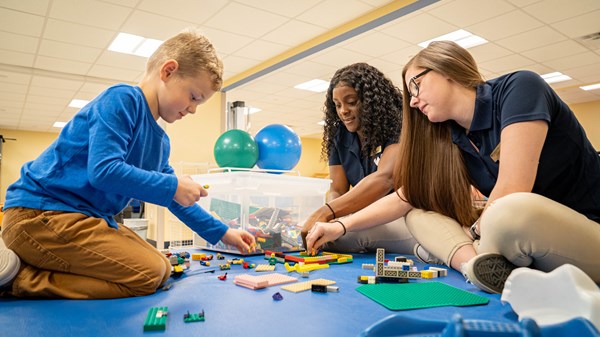
Occupational Therapy

Classroom, community and clinical experiences that develop competence and confidence.
Our unique curriculum prepares students to practice in the exciting rehabilitation field of occupational therapy. Occupational therapy students at WVU receive the benefits of hands-on classroom, community and clinical experiences that develop the competence and confidence necessary to achieve career goals.
As part of the School of Medicine, occupational therapy students have access to an abundance of inter-professional learning activities as well as educational resources that include:
- Cutting edge acute care simulation lab
- Anatomy lab cadaver dissection
- Faculty practice clinic
- Current tools for assessment and intervention
Who you are
A helper. A healer. A core member of the care team. Occupational therapists help people function in all of their environments including home, work, school and community through the use of therapeutic everyday activities. In addition, occupational therapists address the physical, psychological and cognitive aspects of their well-being through patient engagement.
Common occupational therapy interventions include:
- Helping children with disabilities to participate fully in school and develop social skills
- Help people recovering from injury to regain function through retraining or adaptations
- Providing supports for older adults experiencing physical and cognitive changes
- Modifying environments to support home and community independence and life satisfaction
Our faculty
Masters- and doctoral-level faculty are clinical experts with extensive professional publications along with state, national and international presentations.

What you'll do
Our graduates find employment almost anywhere in the world. You will find our alumni working in
- Schools
- Hospitals
- Rehabilitation centers
- Home health agencies
- Skilled nursing homes
- Private practice
- Research facilities
Connect with Us
Stay connected with what's happening at the School of Medicine.
Recent News
Accreditation
The MOT program is accredited by the Accreditation Council for Occupational Therapy Education (ACOTE) of the American Occupational Therapy Association (AOTA), located at 7501 Wisconsin Avenue, Suite 510E Bethesda, MD 20814. ACOTE's telephone number c/o AOTA is (301) 652-AOTA and its web address is www.acoteonline.org. Graduates of the MOT program are eligible to sit for the national certification examination for the occupational therapist administered by the National Board for Certification in Occupational Therapy (NBCOT). After successful completion of this exam, the individual will be an Occupational Therapist, Registered (OTR). In addition, all states require licensure in order to practice; however, state licenses are usually based on the results of the NBCOT Certification Examination. Note that a felony conviction may affect a graduate’s ability to sit for the NBCOT certification examination or attain state licensure.
The entry-level occupational therapy doctoral degree program is accredited by the Accreditation Council for Occupational Therapy Education (ACOTE) of the American Occupational Therapy Association (AOTA), located at 7501 Wisconsin Avenue, Suite 510E Bethesda, MD 20814. ACOTE’s telephone number c/o AOTA is (301) 652-AOTA and its web address is www.acoteonline.org. Graduates of the program will be eligible to sit for the national certification examination for the occupational therapist administered by the National Board for Certification in Occupational Therapy (NBCOT). After successful completion of this exam, the individual will be an Occupational Therapist, Registered (OTR). In addition, all states require licensure in order to practice; however, state licenses are usually based on the results of the NBCOT Certification Examination. Note that a felony conviction may affect a graduate’s ability to sit for the NBCOT certification examination or attain state licensure.





